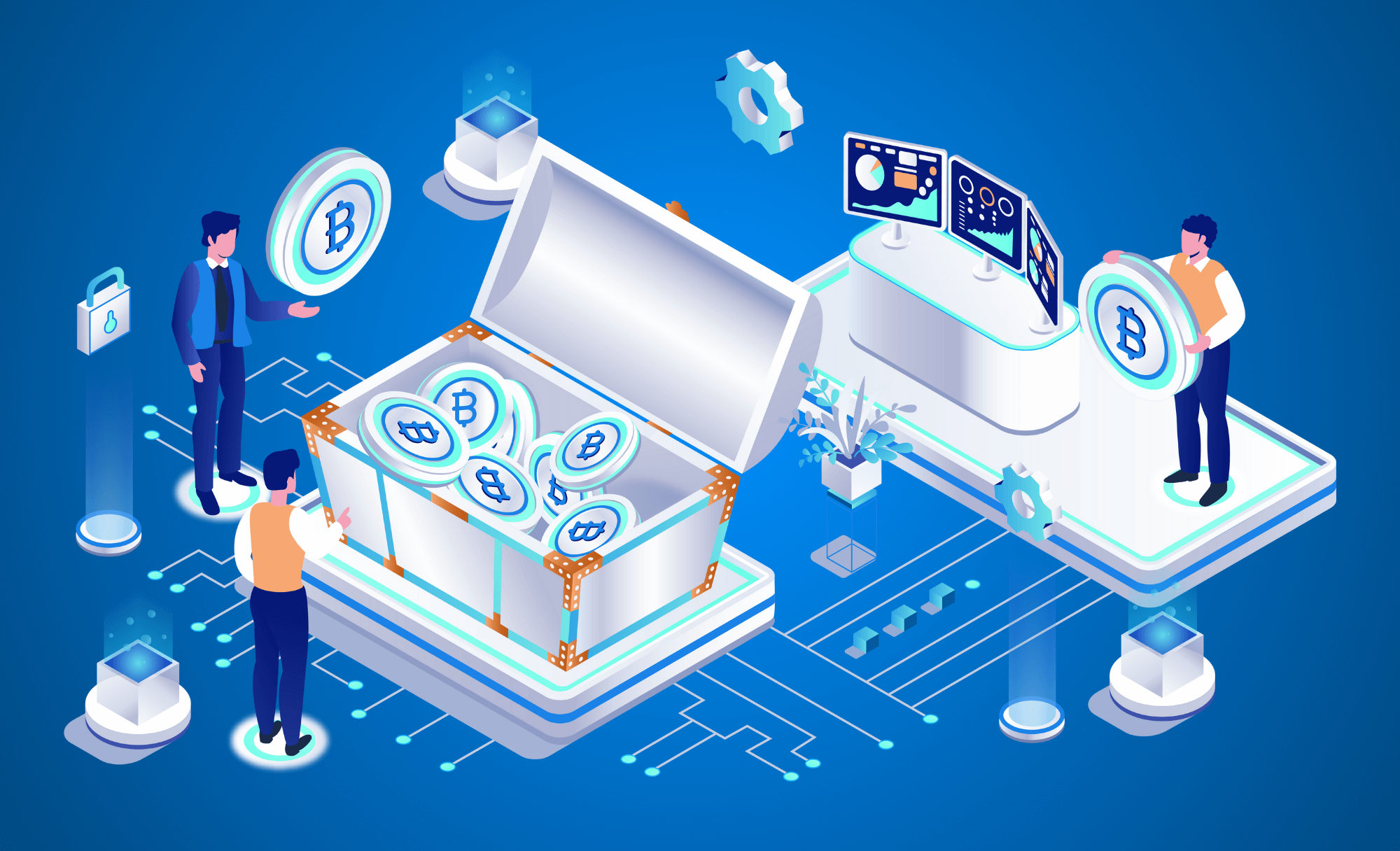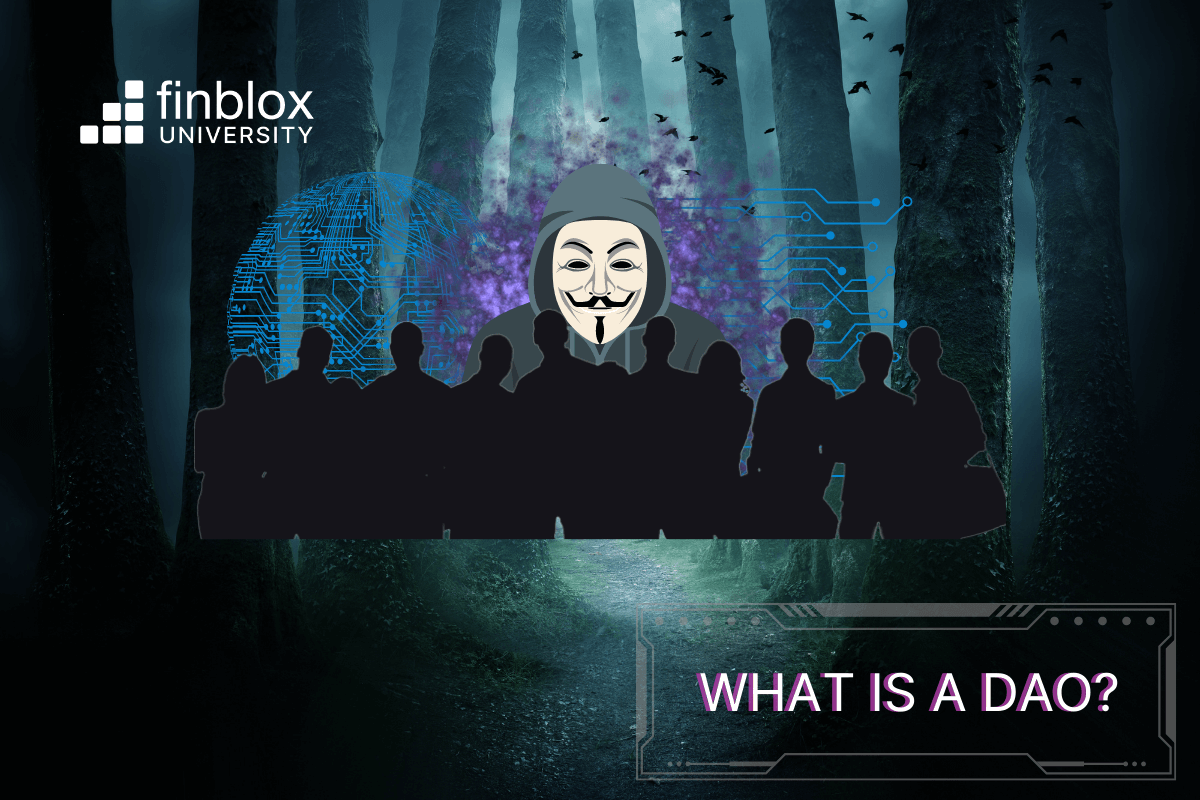Learn all about decentralized autonomous organizations - including their advantages, disadvantages, structure, and creation!
The word "DAO" elicits images of shadowy characters gathered around an ancient table, plotting to dismantle the government in a very "V for Vendetta" sort of fashion. Indeed, DAOs were once associated with the dark web in their early days - although they have since evolved into legitimate enterprises that can be worth up to billions of dollars.
A decentralized autonomous organization (DAO) is an organization with a shared objective, whose rules and structure are governed by smart contracts on the blockchain. Voting power is distributed to its members through the form of governance tokens, and proposals can be made by anyone to be voted upon. For all purposes, DAOs can be considered as blockchain-based companies.
However, the legal status of DAOs still remains in contention - and some states do not recognize them as a valid entities. This has proven a double-edged sword, as DAOs can behave like corporations without the need to be incorporated - but any actions that are deemed out of line can be punished severely by the Securities and Exchange Commission and other regulating authorities.
The very first DAO was Dash, an altcoin that was launched as a fork from the Bitcoin protocol and was founded by Evan Duffield. A fork can be defined as a split from the main blockchain, when a group of community members decides to change the protocol and branch in a different direction.
Dash was initially designed to offer maximum user privacy and anonymity by scrambling transactions using the CoinJoin method. CoinJoin requires multiple transacting parties to sign a smart contract that would mix their coins into a new Bitcoin transaction, but also scramble the addresses in the process making it nearly impossible to trace. Several years later, Dash decided to adjust its trajectory to become a widely-used digital currency that could act as cash, credit, or be transferred through Paypal.
What makes Dash a DAO is the decision-making process, which is executed by individuals that act as masternodes. Masternodes are basically extra-powerful nodes that hold a copy of the blockchain, relay messages to other members of the DAO, validates transactions, and votes on proposals in the Dash ecosystem. Anyone who holds at least 1000 DASH can become a masternode.
Although there were several flaws in this design during inception, Dash would eventually pave the way for some of the most well-known DAOs today - including MakerDAO, Uniswap, and Steem.
What types of DAOs are there?
There are virtually no limits when it comes to the types of DAOs one can create, as different organizations can have an infinite number of objectives. Take for instance ConstitutionDAO, which has the outrageous goal of purchasing the United States' Constitution! Still, we've identified 3 primary types of DAOs that are most commonly recognized below:
- DeFi protocol DAOs use smart contracts to bring decentralized finance services to their users. Their objectives can range from the creation of new stablecoins, to allowing cryptocurrency transactions to take place without a middleman. MakerDAO is one of the best examples, as they created a crypto-collateralized stablecoin named DAI that is pegged to the US dollar. Additionally, they created MKR - a governance token that allows holders to vote on the Maker protocol that determines the behavior of DAI.
- Investment DAOs are basically the crowdfunded VCs of the blockchain world that pool their money together in pursuit of a common desire. Some might have a goal of investing in promising startups, while others may be looking to purchase rare art, NFTs, and other bizarre things. Launchpad DAOs could be considered a subset of investment DAOs, but their focus is more on funding new blockchain projects.
- Social DAOs are the Myspace and Facebooks of the blockchain community that strive to bring similar-minded people together. "Friends With Benefits" started their $FWB token to unite creatives and the culturally-elite, and membership can be purchased for 75 $FWB tokens. ApeDAO was made purely for people who love Bored Apes, but couldn't invest in them without first fractionalizing the shares.
Ultimately, DAOs range in all shapes and sizes - from the professionally-minded ones that manage billions of dollars, to the insanely weird and quirky DAOs made for fan clubs of certain artists.

What are the benefits and disadvantages of DAOs?
- The most obvious benefit of a DAO is that it allows people who are largely disconnected from each other to rapidly unite in pursuit of a common goal.
- Everyone gets a say in the DAO, unlike in traditional corporate structures - where only executives and board members have a disproportionate amount of decision-making power.
- The structure of a DAO naturally ensures that members will act in a way that is best for the protocol's future, as they will be rewarded by an increase in the token's value if they do so - due to increased demand from new members that wish to join the DAO.
- All members have complete anonymity, if they wish.
- DAOs are completely trustless, which means they don't need any management other than the smart contract to run like they're supposed to.
- DAOs are open-source and completely transparent. Anyone can view the internal workings of a DAO.
- On the other hand, this means there are no secrets and this can leave the organization incredibly exposed. Ideas can potentially be copied and claimed credit for.
- If the DAO is infiltrated by a majority or hacked, this could have disastrous results for the rest of the organization.
How are DAOs created?
In order to create a DAO, you first must define a purpose for why that project exists. You will also need to gather other like-minded people who A) can help you with your project and B) confirm that your purpose has value to a decent number of individuals.
Next, you need to decide on a voting and proposals mechanism that will allow other members of your DAO to participate. This is where it starts getting technical, and you will need to choose a blockchain for your DAO to be built on. Ethereum is the most popular choice, and there are many open source programs such as Aragon, Snapshot, and DAOstack that will help you customize a voting & proposals process. Here are some frequently used ones:
- Vote delegation & liquid democracy is a system where you can transfer your votes to another member who you think is more "qualified" than you to make an informed decision on the protocol. This is effective because it is still fair, while allowing experts a chance to guide the protocol in the right direction
- Quadrac voting allows members to express how strongly they feel about a certain proposal by casting multiple votes. However, the catch is that each vote consumes tokens equal to the number of votes squared.
- Holographic consensus involves two levels of voting - a crowd of observers, and a smaller crowd of members with actual voting power. The idea behind this is that more member attention needs to be drawn to proposals - otherwise only those with voting power will care/participate! This system allows the observers to "bet" on which proposals are more likely to pass, and they receive rewards if they are correct. Meanwhile, only proposals with enough "bets" on them get passed on to the voters - who then decide the future of that protocol.
Don't stress over it, we know it's alot. More importantly, you'll need to create a governance token or shares system that will allow people to join your DAO. The only difference with a shares system is that the potential member must first submit a request to your organization to join, and cannot just buy in. This helps the DAO assess the expertise and qualities of a potential member, and to control admission. For example, MolochDAO funds Ethereum projects - and does not let anyone join without submitting a proposal first. The proposal is then reviewed by other members to determine their level of experience with Ethereum, and that they have the minimum required capital to contribute.
Once all of this has been done, you will need to market your DAO by creating a community. Most DAOs have a private Discord and standard social media platforms such as Facebook, Twitter, Reddit, etc. A larger community is key to the concept of decentralization - which will make your DAO more representative when it comes to voting power.
Finally, you will need to establish a treasury for your DAO. This can be tricky due to the fact that no single person should have sole access or spending power when it comes to the DAO wallet. However, multiple signatory systems can be set up so that the wallet requires the private key of multiple members to be applied (think nuclear codes that have to be entered one after the other) before it can be opened and spent. Some wallets can even have rotation mechanisms where these authorized members are periodically swapped for other members, ensuring decentralization of control.

The Takeaway:
DAOs still make up a fairly small portion of the overall cryptocurrency market, with a total market capitalization of 30 billion dollars as we speak. In contrast, the DeFi sector has a whopping 180 billion in total market cap. Nonetheless, DAOs may give a glimpse into the future as to what companies could look like if we continue down the path of decentralization.
Here at Finblox, we believe in the democratization of wealth building. Though we are not a DAO, our treasury is managed similarly to one and invested into yield-generating protocols that allow us to give amazingly competitive returns for our users.
Thanks for reading! Please subscribe if you haven't already - and stay tuned for our next article, which will teach you how to make even MORE money through staking and yield farming!
This content is provided for informational purposes only, and should not be relied upon as legal, business, investment, or tax advice. You should consult your own advisers as to those matters. Charts, graphs and references to any digital assets are for informational and illustrative purposes only.


